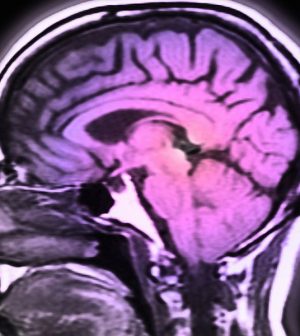- Are You Making This Expensive Thermostat Error This Winter?
- Recognizing the Signs of Hypothyroidism
- 10 Strategies to Overcome Insomnia
- Could Artificial Sweeteners Be Aging the Brain Faster?
- Techniques for Soothing Your Nervous System
- Does the Water in Your House Smell Funny? Here’s Why
- Can a Daily Dose of Apple Cider Vinegar Actually Aid Weight Loss?
- 6 Health Beverages That Can Actually Spike Your Blood Sugar
- Treatment Options for Social Anxiety Disorder
- Understanding the Connection Between Anxiety and Depression
Toxin in Undercooked Meat Shows Links to Rare Brain Tumors

A foodborne pathogen may be linked to a type of rare brain cancer in adults, a new study suggests.
Researchers found that people who have glioma are more likely to have antibodies to toxoplasma gondii than a similar group that was cancer-free. That indicates they were previously infected with the parasite, which is most commonly acquired from undercooked meat.
The investigators examined the association between T. gondii antibodies measured several years before the cancer was diagnosed and the risk of developing a glioma. Study participants were from an American Cancer Society Study and the Norwegian Cancer Registry’s Janus Serum Bank.
“This does not mean that T. gondii definitely causes glioma in all situations. Some people with glioma have no T. gondii antibodies, and vice versa,” researcher James Hodge said in an American Cancer Society news release. He’s an epidemiologist at the society.
“The findings do suggest that individuals with higher exposure to the T. gondii parasite are more likely to go on to develop glioma,” said co-author Anna Coghill, from the H. Lee Moffitt Cancer Center and Research Institute in Tampa, Fla. “However, it should be noted that the absolute risk of being diagnosed with a glioma remains low, and these findings need to be replicated in a larger and more diverse group of individuals.”
Glioma is a relatively rare, but often fatal, cancer. About 80% of malignant brain tumors are gliomas. They have a five-year relative survival rate of just 5%.
The study pointed out that the association between T. gondii antibodies and glioma was similar in two demographically different groups of people. The cancer society cases involved people who were approximately 70 at the time of blood draw, while those in the Janus cohort were about 40, on average.
These results suggest that reducing exposure to this common foodborne pathogen could prove a modifiable risk factor for highly aggressive brain tumors in adults, according to the study.
The authors noted that “if future studies do replicate these findings, ongoing efforts to reduce exposure to this common pathogen would offer the first tangible opportunity for prevention of this highly aggressive brain tumor.”
More information
The U.S. Centers for Disease Control and Prevention has more information on T. gondii.
SOURCE: American Cancer Society, news release, Jan. 11, 2021
Source: HealthDay
Copyright © 2026 HealthDay. All rights reserved.










